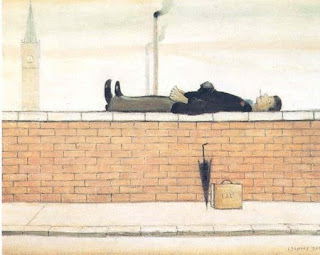We know that tobacco had its opponents from the day it was first introduced to these shores - not least in King James I, who wrote a diatribe against this 'vile custom'.
This poem presents an entertaining rant from later in the C17th - from the reference to Cromwell ('the Protector's name') I guess it was written sometime in the in the late 1650s.
It took 300 years, & proof, as presented by the Royal College of Physicians, of just one specific threat to health from smoking (lung cancer) to finally start to reverse the long love affair with tobacco.
ON TOBACCO.
WHAT horrid sin condemn'd the teeming Earth,
And curst her womb with such a monstrous birth ?
What crime America, that Heav'n would please
To make thee mother of the world's disease ?
In thy fair womb what accidents could breed,
What plague give root to this pernicious weed?
Tobacco ! oh, the very name doth kill,
And has already fox'd my reeling quill :
I now could write libels against the king,
Treason, or blasphemy, or any thing
Gainst piety, and reason; I could frame
A panegyric to the Protector's name :
Such sly infection does the world infuse
Into the soul of ev'ry modest Muse.
What politic Peregrine was't first could boast,
He brought a pest into his native coast?
Th’ abstract of poison in a stinking weed,
The spurious issue, of corrupted seed;
Seed belch'd in earthquakes from the dark abyss,
Whose name a blot in Nature's herbal is.
What drunken fiend taught Englishmen the crime,
Thus to puff out, and spawl away their time ?
Pernicious weed, (should not my Muse offend,
To say Heav'n made aught for a cruel end)
I should proclaim that thou created wert,
To ruin man's high, and immortal part,
The Stygian damp obscures our reason's eye,
Debauches wit, and makes invention dry;
Destroys the memory, confounds our care;
We know not what we do, or what we are:
Renders our faculties and members lame
To ev'ry office of our country's claim.
Our life's a drunken dream devoid of sense,
And the best actions of our time offence.
Our health, diseases, lethargies, and rheum,
Our friendship's fire, and all our vows are fume.
Of late there's no such thing as wit, or sense,
Counsel, instruction, or intelligence:
Discourse that should distinguish man from beast,
Is by the vapour of this weed supprest;
For what we talk is interrupted stuff,
The one half English, and the other puff:
Freedom and truth are things we do not know,
We know not what we say, or what we do:
We want in all the understanding's light,
We talk in clouds, and walk in endless night.
We smoke, as if we meant, conceal'd by spell,
To spy abroad, yet be invisible :
But no discovery shall the statesman boast,
We raise a mist wherein our selves are lost,
A stinking shade, and whilst we pipe it thus,
Each one appears an
ignis fatuus.
Courtier and peasant, nay the madam nice
Is likewise fall'n into the common vice :
We all in dusky error groping lie,
Robb'd of our reasons, and the day's bright eye,
Whilst sailors from the main top see our isle
Wrapt up in smoke, like the Aetnean pile.
What nameless ill does its contagion shroud
In the dark mantle of this noisome cloud ?
Sure 'tis the Devil: Oh. I know that's it,
Foh! how the sulphur makes me cough and spit!
Tis he; or else some fav'rite fiend, at least,
In all the mischief of his malice drest,
Each deadly sin that lurks t' intrap the soul;
Does here conceal'd in curling vapours roll:
And for the body such an unknown ill,
As makes physicians' reading, and their skill,
One undistinguish'd pest, made up of all
That men experienc'd do diseases call;
Coughs, asthmas, apoplexies, fevers, rheum,
All that kill dead, or lingeringly consume;
Folly and madness, nay the plague, the pox,
And ev'ry fool wears a Pandora's box.
From that rich mine the stupid sot doth fill,
Smokes up his liver, and his lungs, until
His reeking nostrils monstrously proclaim,
His brains and bowels are consuming flame.
What noble soul would be content to dwell
In, the dark lanthorn of a smoky cell?
To prostitute his body and his mind
To a debauch of such a stinking kind?
To sacrifice to Moloch, and to fry,
In such a base, dirty idolatry;
As if frail life, which of itself 's too short,
Were to be whift away in drunken sport?
Thus, as if weary of our destin'd years,
We burn the thread so to prevent the shears.
What noble end can simple man propose
For a reward to his all-smoking nose ?
His purposes are level I'd sure amiss,
Where neither ornament nor pleasure is.
What can he then design his worthy hire?
Sure 'tis t' inure him for eternal fire:
And thus his aim must admirably thrive,
In hopes of Hell, he damns himself alive.
But my infected Muse begins to choke
In the vile slink of the increasing smoke,
And can no more in equal numbers chime,
Unless to sneeze, and cough, and spit in rhyme.
Half stifled now in this new time's disease,
She must
in fumo vanish, and decease.
This is her fault's excuse, and her, pretence,
This satire, perhaps, else had look'd like sense.
Charles Cotton
Links
Charles Cotton
The works of the English poets, from Chaucer to Cowper: including the series edited with prefaces, biographical and critical
James I: Counterblast to tobacco
Related post
A poem about smoking

